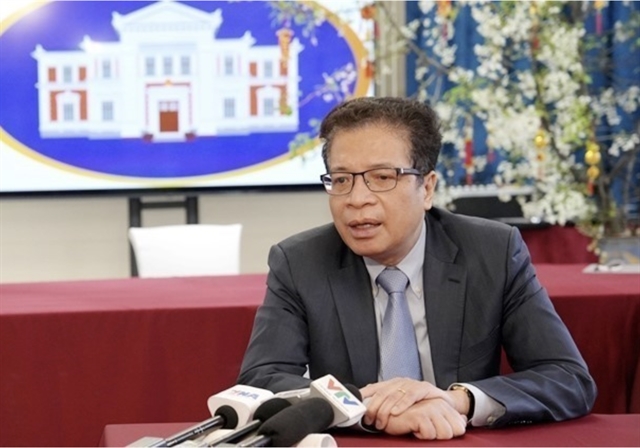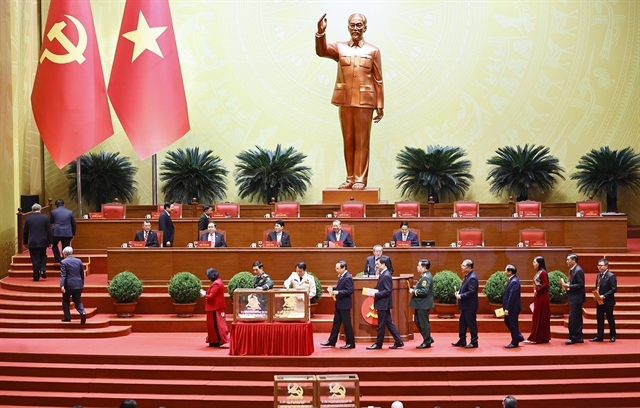 Opinion
Opinion

Economist Phạm Chi Lan talks to online newspaper Vietnamnet about measures needed to trim down people dependent on State payroll.
Why do we need to trim down the number of public servants?
Our State system has about 2.8 million on staff. In addition, there are retirees on pensions, and other people receiving salary and subsidies from the State budget. With these additions the combined number rises to 7.5 million, accounting for 8.3 per cent of Việt Nam’s population. The total number of people receiving a salary from the State budget stands at 11 million. No State budget can feed such a big salaried system.
The United States is 30 times bigger than Việt Nam in size and four times larger in population, but their State employees stand at only 2.1 million. Look at China – China’s state employees account for only 2.8 per cent of their population.
So we can see that the US pays one state employee for every 160 Americans. Meanwhile Việt Nam pays one state employee for every 40 Vietnamese. That is not to mention the burden that the Vietnamese have to suffer from bureaucracy, harassment for bribes, corruption and maladministration created by a not-so-small number of state employees among those 2.8 million.
Việt Nam’s regular yearly spending stands at around 68-69 per cent of GDP. This could sometimes hit 72 percent. Prime Minister Nguyễn Xuân Phúc this year approved a lower regular spending of 65 per cent, but it still remains at the same level. About 30 per cent of the GDP goes to the debtors. So the investment for development this year is only 17 per cent.
While there are so many people on State payroll, some say the quality of State employees is not high. What is your take on this?
When Phúc was Deputy Prime Minister, he said: “Only about 30 per cent of our State employees meet the job’s requirements.” I want to add to this: another 30 per cent are listed as “drag the morning and evening umbrella in and out of the office” [implying they do no work business hours]. Former Minister of Information and Communications Lê Doãn Hợp shared my point as he once said: “30 per cent of those who do come to office not only fail to do their work properly, but are also corrupt and harass our people for bribes”.
The matters of administrative reform, reducing State employees and reducing the number of people on the State payroll have been discussed many times. However, after four attempts to deal with this, the number of people on State payroll has not declined. It apparently has grown. Are we giving up?
I asked many people whether we could reduce the number of State employees. The answer I consistently got is NO. We can not.
There is only one way. That is to abandon the policy of life-long State employees; switching to a contract employment policy instead. There is nothing new in this. Experts have been talking about this change for the last 20 years. The life-long State employee policy will be an obstacle for development. We need to make this change based on the new Law on Officials and Public Servants. Instead of having “life-long public servant”, we have to define job positions, job requirements and set out criteria for people who hold particular jobs in the public service sector.
In the modern public service system, each state employee is a qualified fit for each particular position in terms of education and professional experience. We have to aim for such a modern public service system. Many countries in the world have done this. Take New Zealand for example. They have been doing this since 2000. They have only work contracts for state employees, not life-long employees. This policy is applied even at the deputy minister level.
If such a policy is implemented as you said, how will the State payroll budget be allocated?
We allocate remuneration budget for State employees according to tasks and responsibilities of each agency. For example: How many staff does a Minister, Chairman of the People’s Committee, Head of Department, Head of Administration need? Those staff would be employed based on contracts, with results-based remunerations. Then we will have qualified State employees, not incompetent ones. In that case, qualified human resources stay with the State, instead of leaving the state sector for private and foreign companies.
Under this policy, head of state agencies would have full authority on remuneration for the agency’s employees. If the task is not completed, we will see it as rejected expenditures. In that case we will have a healthy competitive environment for getting the job done; cronyism will cease being an issue.
Everyone knows that political organisations, associations and unions are also “a burden” on the State budget, but not everyone knows details about that “burden”. Could you please give us a general picture on this?
According to the 2016 Estimate for Central Government Expenditure Budget, published on the Ministry of Finance’s website, total expenditures of six central social-political organisations account for up to VNĐ1.5 trillion.
However, this is only the expenditure for associations and unions that are public. There are many more specialised associations, both at the central and local level, that have been enjoying the State budget in parts, but their expenditure figures haven’t been made public in the data from the Ministry of Finance. Those particular associations range from the Việt Nam Football Federation, Việt Nam Traditional Medicine Association, Việt Nam Association for Promoting Association, Việt Nam Association of the Elderly, Việt Nam Blind Association, and many other associations.
The research also estimated that if taking into the account all costs, including social-economic expenditure, which includes land, houses, offices, cars, transportation and other properties, the early expenditure for such associations would take up to 1.7 per cent of GDP. In these associations and unions, particularly social-political organisations, they maintain the structure pretty much the same as it was during the centrally-planned economy era before Đổi Mới, in which its structure follows the administrative model, offering life-long jobs to employees, maintaining houses, offices, cars, etc.
To reduce the burden on the State budget, and to put associations and unions back in their right positions and functionalities, which was initially set forth by President Hồ Chí Minh with the motto “Organisations of the masses established on the foundation of voluntary participation, self-dependence, and self-responsibility on operational finance”, do you think this is the time to seriously follow this motto?
Experts, researchers and policy advisors have for many years been talking about the legitimate need to change those organisations into voluntary organsations, serving the needs of different community groups. These associations have to take up responsibility and have to be self-reliant financially, by raising funds from the community, looking for sponsorship or membership fees. The state can provide financial support in part, but this support is based on clear criteria and transparency, healthy competition, and is result-and-merit oriented.
In many countries, political organisations might have to declare tax reports and do tax duties, or they have to be dependent on funding from civil society.
It is the time to for us to complete this with determination, given the public debt has been increasing while revenue sources have become limited, faced extreme difficulties, and regular expenditure has been increasing.
If we do this, millions of officials from these associations would lose their jobs. Is this going to be “political pressure” on society?
Employees at the associations and unions are the same as employees at other State agencies. We can reduce the State employees, so why is it not possible with these organisations? If they are truly for the interests of the Party, the people and the country, then they have to sacrifice personal benefits just like many other citizens would. Of course when we make that change, we have to do it with a roadmap so that these organisations can adapt to the fact that they no longer can hold on to and enjoy the “milk reservoir” of the state budget. To do this, there must be a very strong determination from the whole political system, particularly the leadership of the Party. — VNS




